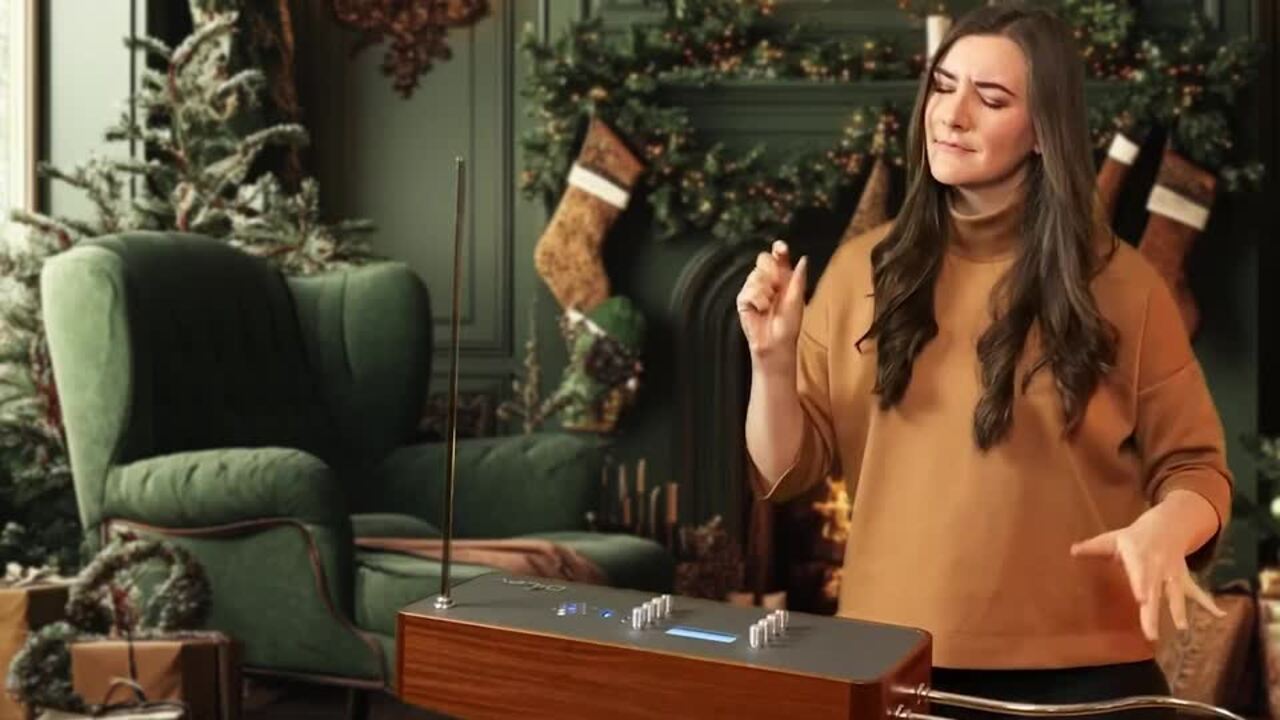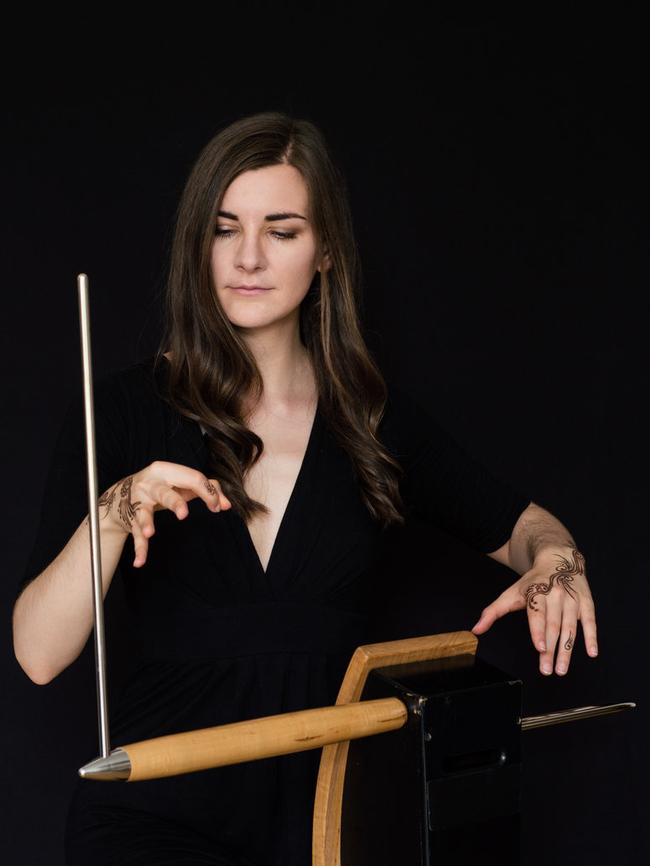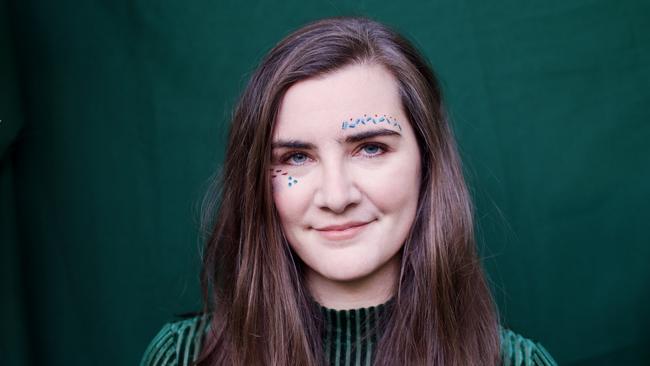How musician and composer Carolina Eyck rediscovered her love of the strangest instrument ever invented
Ahead of her first Australian tour with the ACO, Carolina Eyck opens up about the realities of performing from such a young age — and why fans can’t get enough of the weird and wonderful world of the theremin.
As the world was submerged in the darkest period of pandemic-induced lockdown, Carolina Eyck felt that, for the first time, she could finally come up for air.
Eyck, a German-Sorbian, now 37, had been on autopilot since the beginnings of her career as a professional musician, composer and vocalist. In the years before the pandemic, she had been touring consistently, playing across 30 countries with the likes of the Argentine National Symphony Orchestra, BBC Philharmonic and Brussels Philharmonic.
By 2020, she had learned a difficult lesson; the burden of her success was finally catching up with her.
“Everybody was complaining that concerts had been cancelled but part of me was really happy. I was feeling really ungrateful,” Eyck says. “Towards the end I had overworked myself to the point where I was thinking: ‘Why am I even going on stage? Is this even my choice?’.
“I was done with the world. During that whole period, I enjoyed not having to think about my ego for the first time.”
Exactly how long she had been captive to her career is a difficult question for Eyck to answer. In the world of classical there is a blurred line where a musician’s career begins: At what point does the child prodigy – factoring in countless hours of intensive music school programs, at-home practice, and concert recitals – become the fully fledged touring virtuoso?
Speaking to The Australian via video call from her Berlin apartment, she reflects on the pressures of performing from such a young age.
“Quitting back in school wasn’t an option for me,” says Eyck. “I had been on stage since I was eight years old, so there was never any question about it.”
While she mastered violin and piano, among other instruments, in her early years at music school and then at the Royal College of Music in Stockholm, Eyck has amassed a global cult following for being one of the world’s foremost – and highly sought after – theremin players. Videos of her playing the unique and little-known instrument have attracted global fascination online with more than 10 million views.

The theremin, the first widely recognised electronic instrument, relies on metal antennas to create an electromagnetic field that allows it to be played without any physical contact. Hovering one hand near each antenna enables the player to adjust frequency and volume; striking the right balance with both hands creates the perfect pitch for each note. It was invented in the mid-20th century by Soviet Russian inventor Leon Theremin and it was his grand-niece, Lydia Kavina, who taught Eyck to play.
“She was the only one teaching back then because there weren’t many theremin players,” Ecyk says. “There was no internet back then, of course, so I would only see her twice a year when she travelled to Berlin or Hamburg (from Russia).”

Eyck’s parents, who had introduced her to the theremin at age seven (“they have videos of me trying it for the first time, I was awful”), were the driving forces behind her love of music. Her father, a university tutor who pioneered the study of electronic music at the Berlin Hochschule fur Musik Hanns Eisler, and her mother, a high school biology teacher, lived in what was then East Berlin. Both dabbled in music when Eyck was a toddler.
“Dad played electronic, meditative music with his friend, and Mum did their lighting. I hear stories about it being really hard to bring equipment (across the border) so it was quite a special thing back then,” Eyck says. “Then (after the fall of the Berlin Wall, in 1989) they eventually founded a music company.”
She recalls how, as a child, she would sit atop equipment backstage, mesmerised by the synth music. “It was a really exciting and interesting time. I got to hear all of this so early so I think that’s the reason I still love it today,” says Eyck.

However, in her teenage years, Eyck and her brother, a double bass player, faced the breakdown of their parents’ marriage.
“I was very depressed, I just wanted that period of my life to be finished. In general, being a teenager isn’t the easiest. Then it added up with my parents separating, instrument practice, performing concerts.”
During that time she found solace in music, adding singing to her already expansive repertoire. “I listened to a lot of Sting when my parents separated. And I found a lot of freedom in jazz music. But I also started singing more.
“It was around 2010 after I went to a Bobby McFerrin concert in Leipzig alone,” she says. “He asked people to sing on stage with him so I jumped at the opportunity. The experience gave me the biggest high afterwards. It was only later that I realised (the concert) was part of an a cappella festival and more than half the audience were singers.”
Next month, Eyck will play the theremin for Australian audiences on her first national tour, with the Australian Chamber Orchestra and its artistic director, Richard Tognetti. Reclaiming the love of music she temporarily lost to burnout, Eyck is stepping into the light to perform on her own terms.
She now only performs when she “really wants to do something” and, when it comes to touring with the ACO, she confirms: “I haven’t been so excited about a concert in a very long time.”
Eyck, who has travelled to Australia only once previously, performing solo at the now-cancelled Tasmanian arts festival Mona Foma, promises an innovative set list that will be as “fun” for her as it is for audiences – it was the condition of her agreeing to play.
“When we were brainstorming, a beautiful song was suggested but I’ve played it a billion times,” she says. “I said, ‘Come on, I’ve played it a zillion times, I can’t do this. We’re playing something new’.”
Over two weeks, audiences will witness a diverse and vibrant suite from the Beach Boys’ most iconic hits – which Eyck will play for the first time on the theremin – to the Star Trek theme. Also on the set list is composer Rimsky-Korsakov’s vibrant Flight of the Bumblebee (1900) played alongside a debut contemporary commission, Hovercraft, by up-and-coming Sydney-based composer Holly Harrison.
“It can be a very isolating experience as a soloist with an orchestra. That’s why I’m so excited to play across 10 concerts with the ACO. We’ll have three days of rehearsals so I’ll really get to know the names and faces. We’ll feel like a group,” Eyck says.
She also believes audiences will be impressed by the technical precision needed to play the theremin, which she describes as a “3D instrument”.
“Back in the early days, I came up with an eight-finger position technique for playing. I’m now writing a book that brings it up to 40 positions to make sure the pitch is correct. It’s all about learning to feel your body so you can get the right balance of muscle tension,” she says.
Richard Tognetti says the instrument remains a rarity among orchestras.
“The theremin is such an amazing instrument to play, and one with so much history dating back to the Weimar years (in the 1920s), that age of invention, of discovery, of extreme curiosity,” Tognetti says. “Carolina will bring all of that to the concert.”
This spark of extreme curiosity has been relit once more for Eyck, bringing her journey full circle.
“I’m practising the very basic thing of wanting to care for myself. It sounds very simple but I’m meditating in the mornings and working on other projects where I can … I’m not putting too much pressure on myself, which means I’m really looking forward to playing in Australia with the ACO.”
As with most things – theremin playing included – it’s all about finding the right balance.
Carolina Eyck’s national tour with the Australian Chamber Orchestra, runs from May 8 to 20.



To join the conversation, please log in. Don't have an account? Register
Join the conversation, you are commenting as Logout